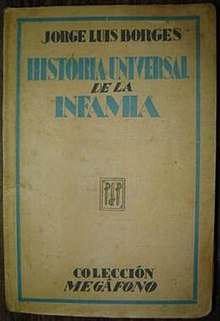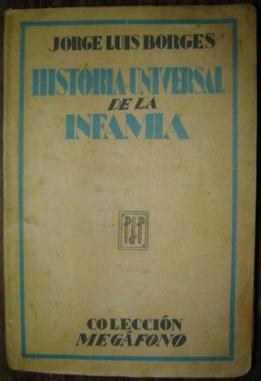A Universal History of Infamy, or A Universal History of Iniquity (original Spanish title: Historia universal de la infamia), is a collection of short stories by Argentine writer Jorge Luis Borges, first published in 1935, and revised by the author in 1954. Most were published individually in the newspaper Crítica between 1933 and 1934. Angel Flores, the first to use the term "magical realism", set the beginning of the movement with this book.[1]
 First edition (1935) | |
| Author | Jorge Luis Borges |
|---|---|
| Original title | Historia universal de la infamia |
| Translator | Norman Thomas di Giovanni |
| Language | Spanish |
| Publisher | Editorial Tor (1935) Emecé (1954) |
Publication date | 1935, 1954 |
| Publication place | Argentina |
Published in English | 1972 |
| Media type | |
| ISBN | 0-525-47546-X |
| OCLC | 541339 |
The stories (except Hombre de la esquina rosada) are fictionalised accounts of real criminals. The sources are listed at the end of the book, but Borges makes many alterations in the retelling—arbitrary or otherwise—particularly to dates and names, so the accounts cannot be relied upon as historical. In particular, The Disinterested Killer diverges from its source material.
Two English translations exist, the first from 1972 and the second from 1999 (part of a collected edition, published as a separate book in 2004). The 1972 English edition (A Universal History of Infamy, ISBN 0-525-47546-X) was translated by Norman Thomas di Giovanni. The 2004 English edition (A Universal History of Iniquity, ISBN 0-14-243789-1), translated by Andrew Hurley, was published by Penguin Classics, a division of British publisher Penguin Books.
Borges was reluctant to authorise a translation. In his preface to the 1954 edition, Borges distanced himself somewhat from the book, which he gave as an example of the baroque, "when art flaunts and squanders its resources"; he wrote that the stories are "the irresponsible sport of a shy sort of man who could not bring himself to write short stories, and so amused himself by changing and distorting (sometimes without aesthetic justification) the stories of other men" and that "there is nothing beneath all the storm and the lightning."
Contents
| Original Spanish title | English (1972) | English (2004) | Central characters |
|---|---|---|---|
| El atroz redentor Lazarus Morell | The Dread Redeemer Lazarus Morell | The Cruel Redeemer Lazarus Morell | John Murrell |
| El impostor inverosímil Tom Castro | Tom Castro, the Implausible Imposter | The Improbable Imposter Tom Castro | Arthur Orton |
| La viuda Ching, pirata | The Widow Ching, Lady Pirate | The Widow Ching – Pirate | Ching Shih |
| El proveedor de iniquidades Monk Eastman | Monk Eastman, Purveyor of Iniquities | Monk Eastman, Purveyor of Iniquities | Monk Eastman |
| El asesino desinteresado Bill Harrigan | The Disinterested Killer Bill Harrigan | The Disinterested Killer Bill Harrigan | Billy the Kid |
| El incivil maestro de ceremonias Kotsuké no Suké | The Insulting Master of Etiquette Kôtsuké no Suké | The Uncivil Teacher of Court Etiquette Kôtsuké no Suké | Kira Yoshinaka |
| El tintorero enmascarado Hákim de Merv | The Masked Dyer, Hakim of Merv | Hakim, the Masked Dyer of Merv | Al-Muqanna |
| Hombre de la esquina rosada | Streetcorner Man | Man on Pink Corner | |
| Etcétera | Et cetera | Et cetera | |
| Un teólogo en la muerte | A Theologian in Death | A Theologian in Death | Philipp Melanchthon |
| La cámara de las estatuas | The Chamber of Statues | The Chamber of Statues | |
| Historia de los dos que soñaron | Tale of the Two Dreamers | The Story of the Two Dreamers | |
| El brujo postergado | The Wizard Postponed | The Wizard that was Made to Wait | |
| El espejo de tinta | The Mirror of Ink | The Mirror of Ink | |
| Un doble de Mahoma (added 1954) | A Double for Mohammed | Mahomed's Double | |
| El enemigo generoso (added 1954) | The Generous Enemy | The Generous Enemy | |
| Del rigor en la ciencia (added 1954) | On Exactitude in Science | On Exactitude in Science |
See also
References
Wikiwand in your browser!
Seamless Wikipedia browsing. On steroids.
Every time you click a link to Wikipedia, Wiktionary or Wikiquote in your browser's search results, it will show the modern Wikiwand interface.
Wikiwand extension is a five stars, simple, with minimum permission required to keep your browsing private, safe and transparent.
